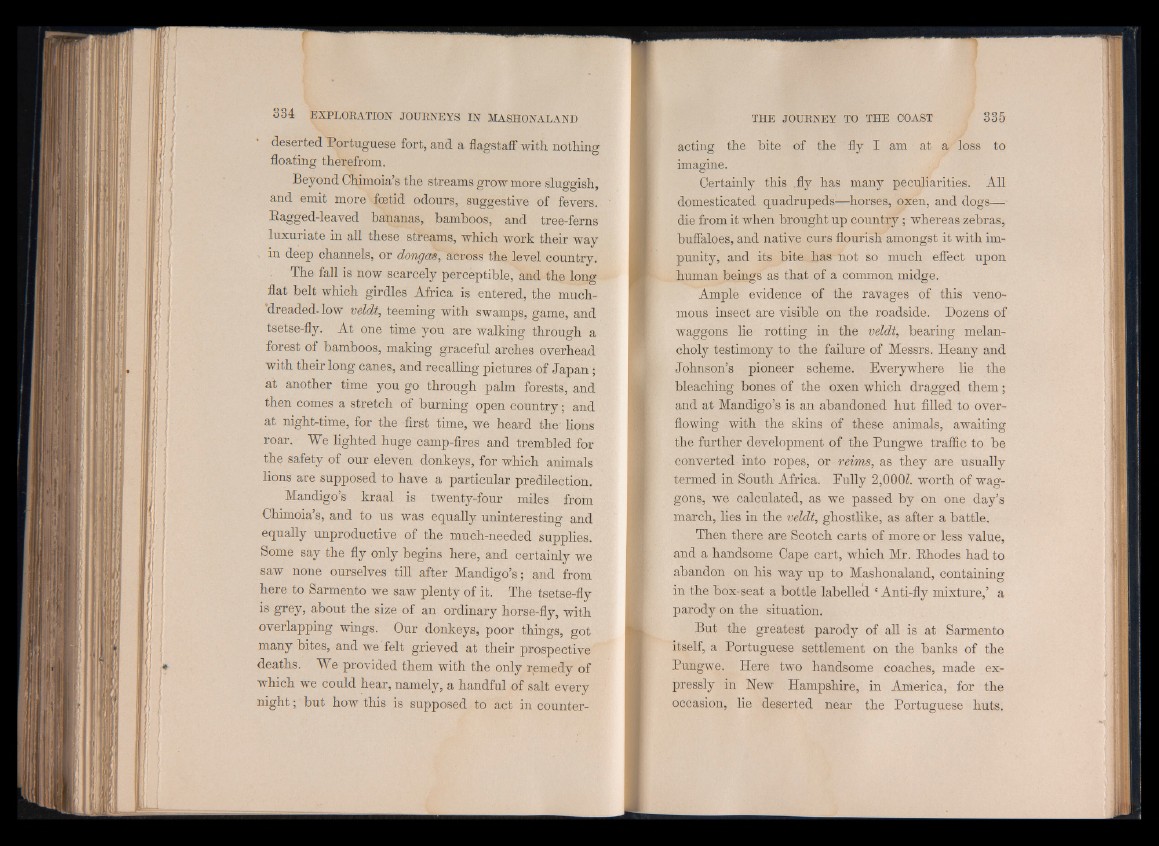
deserted Portuguese fort, and a flagstaff with nothing
floating therefrom.
Beyond Chimoia’s the streams grow more sluggish,
and emit more foetid odours, suggestive of fevers.
Bagged-leaved bananas, bamboos, and tree-ferns
luxuriate in all these streams, which work their way
v in deep channels, or dongas, across the level country.
The fall is now scarcely perceptible, and the long
flat belt which girdles Africa is entered, the much-
*dreaded. low veldt, teeming with swamps, game, and
tsetse-fly. At one time you are walking through a
forest of bamboos, making graceful arches overhead
with their long canes, and recalling pictures of Japan ;
at another time you go through palm forests, and
then comes a stretch of burning open country; and
at night-time, for the first time, we heard the' lions
roar. We lighted huge camp-fires and trembled for
the safety of our eleven donkeys, for which animals
lions are supposed to have a particular predilection.
Mandigo s kraal is twenty-four miles from
Chimoia’s, and to us was equally uninteresting and
equally unproductive of the much-needed supplies.
Some say the fly only begins here, and certainly we
saw none ourselves till after Mandigo’s ; and from
here to Sarmento we saw plenty of it. The tsetse-fly
is grey, about the size of an ordinary horse-fly, with
overlapping wings. Our donkeys, poor things, got
many bites, and we felt grieved at their prospective
deaths. We provided them with the only remedy of
which we could hear, namely, a handful of salt every
nig h t;'b u t how this is supposed to act in counteracting
the bite of the fly I am at a loss to
imagine.
Certainly this .fly has many peculiarities. All
domesticated quadrupeds:—horses, oxen, and dogs—•
die from it when brought up country ; whereas zebras,
buffaloes, and native curs flourish amongst it with impunity,
and its bite has not so much effect upon
human beings as that of a common midge.
Ample evidence of the ravages of this venomous
insect are visible on the roadside. Dozens of
waggons lie rotting in the veldt, bearing melancholy
testimony to the failure of Messrs. Heany and
Johnson’s pioneer scheme. Everywhere lie the
bleaching bones of the oxen which dragged them;
and at Mandigo’s is an abandoned hut filled to overflowing
with the skins of these animals, aw'aiting
the further development of the Pungwe traffic to be
converted into ropes, or reims, as they are usually
termed in South Africa. Pully 2,000Z. worth of waggons,
we calculated, as we passed by on one day’s
march, lies in the veldt, ghostlike, as after a battle.
Then there are Scotch carts of more or less value,
and a handsome Cape cart, which Mr. Bhodes had to
abandon on his way up to Mashonaland, containing
in the box-seat a bottle labelled 6 Anti-fly mixture,’ a
parody on the situation.
But the greatest parody of all is at Sarmento
itself, a Portuguese settlement on the banks of the
Pungwe. Here two handsome coaches, made expressly
in Hew Hampshire, in America, for the
occasion, lie deserted near the Portuguese huts.